- Egypt Tour Magic
- Egypt Tour Packages
- Excursions in Egypt
- Cairo Tours and Excursions
- Hurghada Tours and Excursions
- Soma Bay Tours and Excursions
- Makadi Bay Tours and Excursions
- Sahl Hasheesh Tours and Excursions
- El Gouna Tours and Excursions
- Marsa Alam Tours and Excursions
- Port Ghalib Tours and Excursions
- El Quseir Tours and Excursions
- Dendera and Abydos Day Tours
- Aswan Tours and Excursions
- Luxor Tours and Excursions
- Alexandria Tours and Excursions
- Sharm El Sheikh Tours and Excursions
- Top Rated Tours in 2025
- Optional Excursions in Egypt
- Private Transfer
- Blogs About egypt
- Ancient Egypt
- What You Need To know Before Your First Trip To Egypt
- Best Places to Visit in Egypt 2025
- Top Attractions in Red Sea Resorts 2025
- Top 10 Tourist Activities in Egypt
- Top 30 Activities You Can’t Miss in Egypt
- The Guide to Guided Tours in Egypt
- Egypt’s Ancient and Modern History
- The Nile River
- The Deserts of Egypt
- Historical Sites in Egypt
- Cairo
- Alexandria
- Luxor
- Aswan
- The Red Sea
- Dendera Temple
- El Fayoum Oasis
- Bahariya Oasis
- Siwa Oasis
- Al Alamein
- Marsa Matruh
- Ancient Egyptian gods
- famous Egyptian dishes
- UNESCO World Heritage sites
- About Us
- Why Egypt Tour Magic
- Egypt Tour Magic
- Egypt Tour Packages
- Excursions in Egypt
- Cairo Tours and Excursions
- Hurghada Tours and Excursions
- Soma Bay Tours and Excursions
- Makadi Bay Tours and Excursions
- Sahl Hasheesh Tours and Excursions
- El Gouna Tours and Excursions
- Marsa Alam Tours and Excursions
- Port Ghalib Tours and Excursions
- El Quseir Tours and Excursions
- Dendera and Abydos Day Tours
- Aswan Tours and Excursions
- Luxor Tours and Excursions
- Alexandria Tours and Excursions
- Sharm El Sheikh Tours and Excursions
- Top Rated Tours in 2025
- Optional Excursions in Egypt
- Private Transfer
- Blogs About egypt
- Ancient Egypt
- What You Need To know Before Your First Trip To Egypt
- Best Places to Visit in Egypt 2025
- Top Attractions in Red Sea Resorts 2025
- Top 10 Tourist Activities in Egypt
- Top 30 Activities You Can’t Miss in Egypt
- The Guide to Guided Tours in Egypt
- Egypt’s Ancient and Modern History
- The Nile River
- The Deserts of Egypt
- Historical Sites in Egypt
- Cairo
- Alexandria
- Luxor
- Aswan
- The Red Sea
- Dendera Temple
- El Fayoum Oasis
- Bahariya Oasis
- Siwa Oasis
- Al Alamein
- Marsa Matruh
- Ancient Egyptian gods
- famous Egyptian dishes
- UNESCO World Heritage sites
- About Us
- Why Egypt Tour Magic
Walk Through the Souks of Cairo: A Journey into Egypt’s Heartbeat
Cairo, Egypt’s vibrant capital, is a city where the ancient and the modern intertwine. While its grand pyramids, temples, and museums speak to its glorious past, there is another side to Cairo that reveals the pulse of its everyday life — the bustling souks (markets) of the city. These lively markets are not just places to shop; they’re a journey into Egypt’s rich history, culture, and traditions. Here’s your guide to experiencing the vibrant soul of Cairo through its souks.
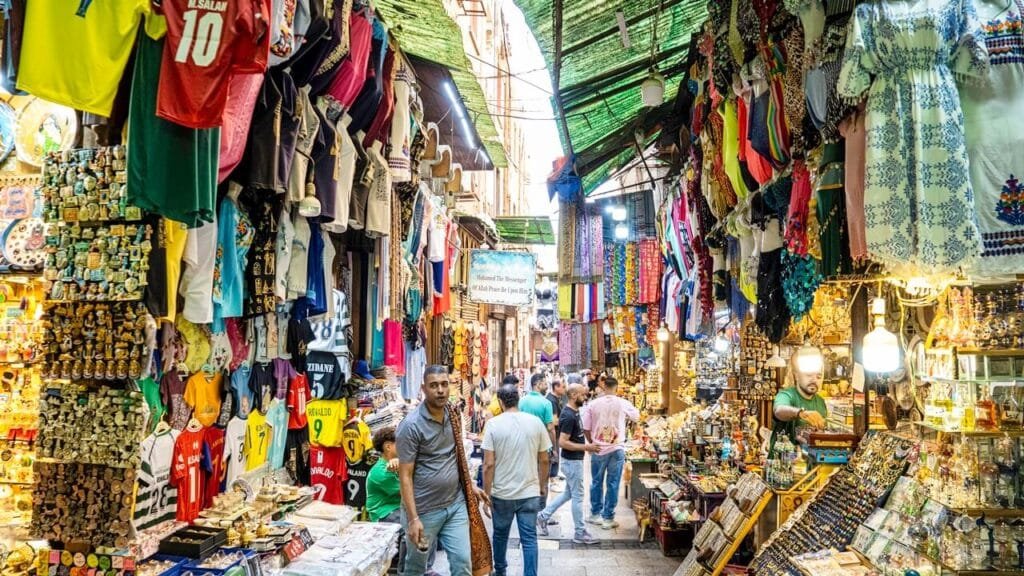
What are Souks?
A "souk" is an Arabic word that refers to a traditional market or bazaar, and it holds deep cultural significance throughout the Arab world, especially in cities like Cairo. These souks are not just commercial centers; they are vibrant cultural hubs where you can experience the pulse of daily life. As you walk through the narrow, crowded alleyways of these markets, you’ll be enveloped by an array of sights, sounds, and smells that make Cairo’s souks unique. The labyrinth of market stalls offers everything from spices, textiles, and perfumes to jewelry, pottery, and antiques. It's not just about shopping — it's about experiencing the essence of Egypt in a way that few other places can offer. The colors of spices, the twinkling of gold jewelry, the scent of exotic perfumes, and the sounds of vendors bargaining all make the souk experience an unforgettable part of any visit to Cairo. And while these markets have evolved over the centuries, they still retain a sense of authenticity and connection to Egypt's deep history. Exploring the souks of Cairo gives you a glimpse into the lives of locals, a taste of the city’s rich cultural heritage, and an opportunity to take home something truly unique. So, while you may visit for a few souvenirs, the experience of walking through a Cairo souk will stay with you long after your trip.
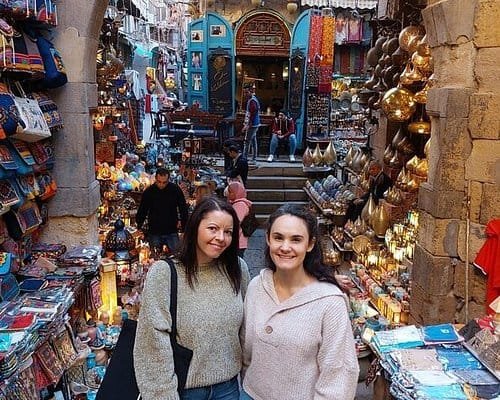
Khan El Khalili Bazaar: The Heart of Cairo’s Souk Culture
Khan El Khalili is one of the oldest and most famous markets in Cairo, and visiting it is an absolute must for anyone wanting to dive into the heart of Egyptian culture. This historic souk dates back to the 14th century and has remained a vital part of Cairo's commercial and social life ever since. Located in the vibrant Islamic Cairo district, Khan El Khalili is a sprawling labyrinth of narrow alleyways lined with over 700 shops offering everything from exotic spices and beautiful textiles to intricate jewelry and hand-carved artifacts. As you walk through the market, you’re likely to be greeted by the calls of enthusiastic vendors eager to showcase their goods. The atmosphere here is electric — a mix of the ancient and the modern, where traditional crafts meet contemporary products. The market is especially famous for its fine silver and gold jewelry, and it’s a great place to pick up intricate, handmade pieces that carry the essence of Egyptian artistry. Khan El Khalili also offers a wide array of authentic Egyptian souvenirs, from brassware to carpets, making it a paradise for those looking for meaningful gifts. But beyond shopping, the bazaar offers a glimpse into daily life in Cairo. The market is full of energy and life, from street performers to local artisans, and it’s one of the best places to witness Egyptian hospitality firsthand. Don’t forget to pause at one of the traditional cafes for a refreshing glass of mint tea or a cup of strong Egyptian coffee — the perfect way to take a break and soak in the bustling atmosphere.
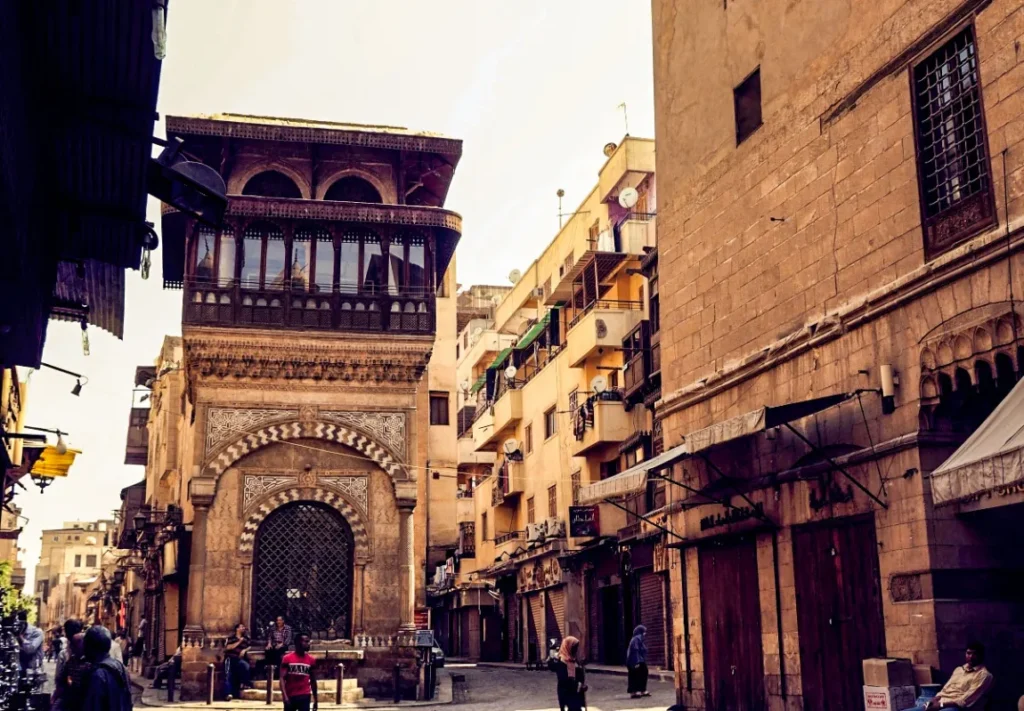
El-Muizz Street: A Blend of History and Modernity
Another market in Cairo that is rich with history and offers an authentic local experience is El-Muizz Street, one of the oldest streets in Cairo. Located in the heart of Islamic Cairo, this street is not only a vibrant souk but also an open-air museum, filled with stunning examples of Islamic architecture. The street itself is lined with ancient mosques, madrasas, and caravansaries, which date back to the 10th century. As you stroll down El-Muizz Street, you'll be surrounded by some of Cairo's finest examples of medieval Islamic art and architecture, with intricate carvings, stained-glass windows, and towering minarets. The souk atmosphere is equally rich — vendors sell everything from hand-woven carpets to handcrafted copperware, perfumes, and clothing. The market has a distinct charm because, while it is a hub for commerce, it still feels like a living, breathing piece of history. Unlike other markets that cater predominantly to tourists, El-Muizz Street has managed to preserve its local character, and the items sold here are often authentic and unique. In addition to the goods, you’ll find numerous cafes and tea houses where you can sit and enjoy a quiet moment while observing the vibrant street life. Many of the cafes have traditional, rustic decor that adds to the street’s old-world charm. A stroll down El-Muizz Street is a delightful combination of shopping, history, and culture, offering visitors an opportunity to immerse themselves in the sights and sounds of one of Cairo’s most ancient areas.
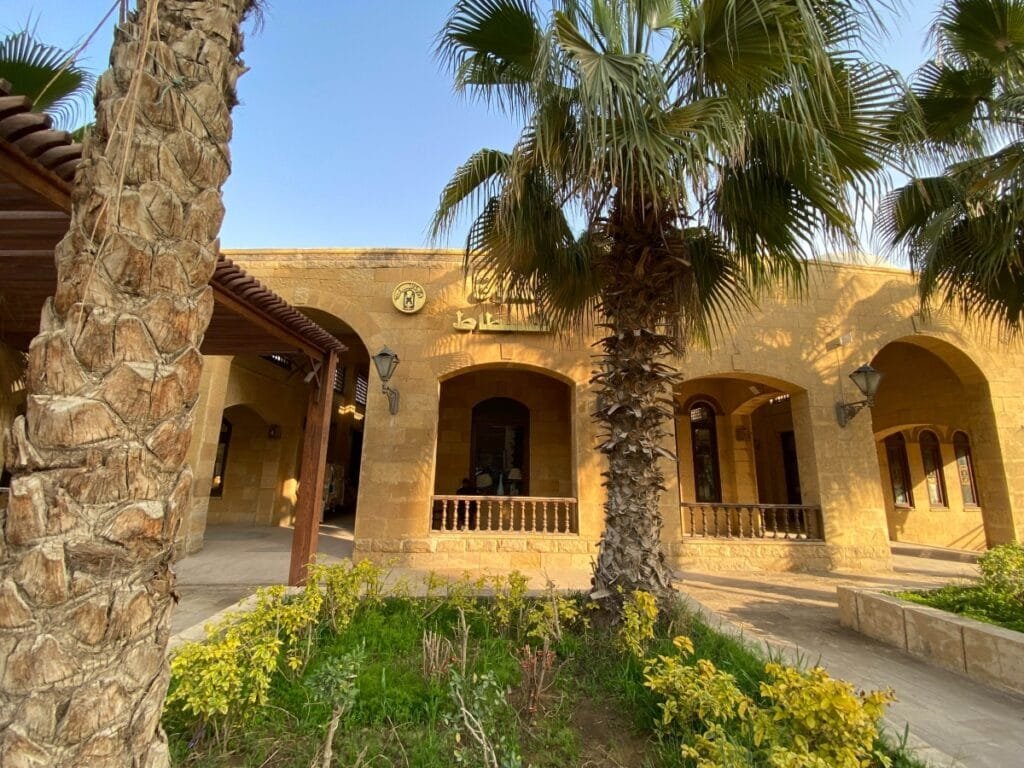
Souk Al Fustat: A Quiet, Artistic Retreat
For those who are seeking a quieter, more artistic shopping experience, Souk Al Fustat near Coptic Cairo is an excellent choice. While it may not be as large or as touristy as Khan El Khalili, Souk Al Fustat offers an intimate and authentic experience of Cairo’s traditional crafts. Located in a picturesque area near the Coptic churches and the famous Hanging Church, Souk Al Fustat is renowned for its handmade goods and artisanal crafts, many of which are created by local artisans who have honed their skills over generations. The market is particularly known for its beautiful pottery, which features traditional Egyptian designs and can make for an excellent souvenir or gift. You’ll also find hand-embroidered textiles, such as scarves, bed linens, and cushions, that showcase the artistry of local craftspeople. Another highlight of Souk Al Fustat is its leather goods, which include shoes, belts, bags, and jackets. These items are made with the finest materials and often feature intricate stitching and designs that reflect the rich Egyptian heritage. In addition to the shopping, Souk Al Fustat offers a peaceful respite from the busier markets of Cairo. The surrounding area is home to some of Cairo’s most important Christian landmarks, and a visit to the market provides a chance to explore the deep-rooted Coptic culture of Egypt. Whether you're in the market for unique handicrafts or simply want to enjoy a slower pace of life in Cairo, Souk Al Fustat is an excellent destination.
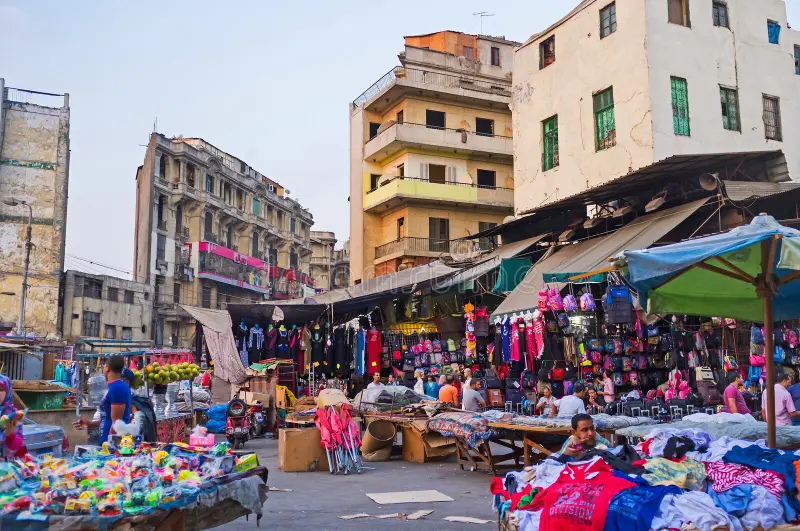
Attaba Market: Cairo’s Local Everyday Experience
For a truly authentic experience, Attaba Market is a great place to explore. This bustling market is not as frequented by tourists, making it one of the best spots to see how the locals shop. Located in a vibrant area of Cairo, Attaba is known for its affordable prices and diverse range of goods. It is primarily a commercial market catering to the daily needs of Cairo's residents. Here, you’ll find everything from household goods and electronics to clothing and food. Attaba is a fantastic place to shop if you’re looking for inexpensive Egyptian fabrics, textiles, and streetwear. One of the highlights of the market is the food section, where vendors sell fresh produce, spices, and street food. The street food in Attaba is a must-try, and it’s the perfect place to sample classic Egyptian dishes like koshari, falafel, and samosas. The market is also home to small but lively shops that sell affordable electronics, so if you’re in the market for gadgets, Attaba is a good spot to explore. Unlike the more tourist-oriented souks, Attaba offers a raw, unfiltered look into Cairo’s daily life. It’s a bustling and sometimes chaotic environment, but that’s part of the charm. The vendors are friendly, and while bargaining is still common, the prices tend to be very reasonable. Whether you're looking to stock up on inexpensive souvenirs, buy everyday items, or simply enjoy the local atmosphere, Attaba is a great destination to experience the real Cairo.
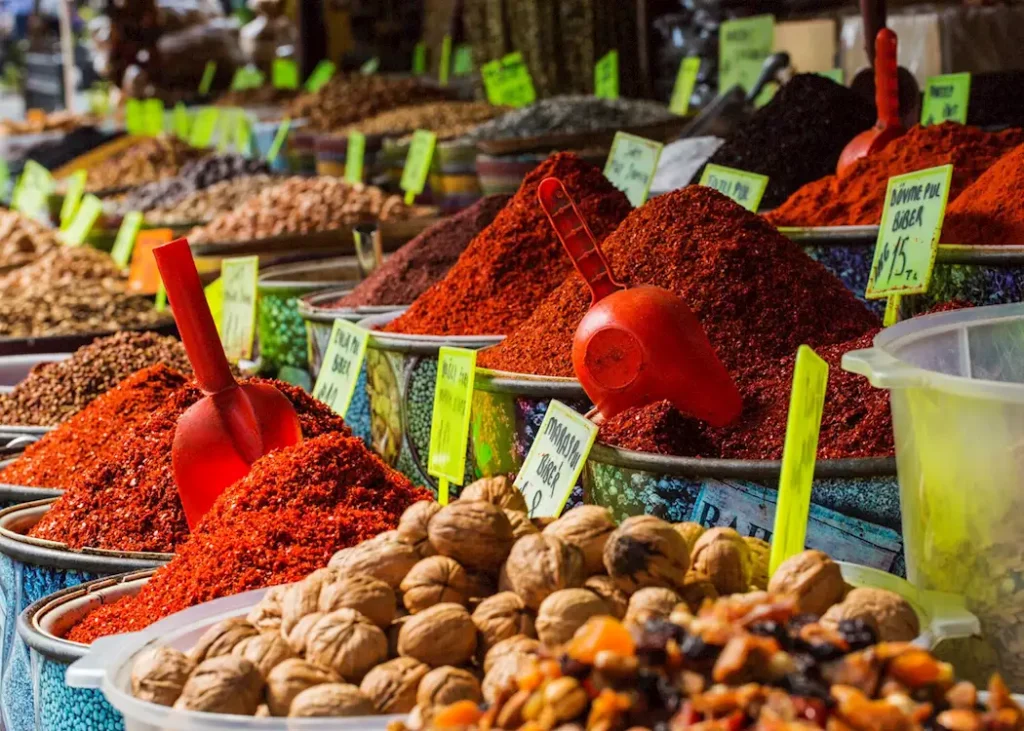
The Spice Market: A Feast for the Senses
In Cairo, the Spice Market is an essential stop for those seeking a truly sensory experience. Located near the heart of Khan El Khalili, this vibrant part of the souk specializes in a wide variety of spices and herbs, many of which are integral to Egyptian and Middle Eastern cuisine. The air is thick with the scent of cumin, coriander, saffron, cinnamon, and exotic blends that instantly transport you to another world. The spices are often displayed in large, colorful mounds, inviting visitors to inhale deeply and take in the rich aromas. Walking through the spice market is like stepping into a living, breathing spice rack, where each stall holds a new, fragrant discovery. Vendors enthusiastically explain the uses and medicinal benefits of their products, making it a great opportunity to learn about the culinary and health traditions of Egypt. Many of the spices sold in this market are used in traditional dishes like koshari (a popular Egyptian street food) or molokhia (a leafy green stew), and some are prized for their ability to promote well-being, such as dried hibiscus flowers used in the refreshing Egyptian drink karkade. In addition to the spices, you’ll also find a range of herbal teas, aromatic oils, and natural beauty products, all prepared in the traditional Egyptian way. Don’t be afraid to bargain with the vendors for the best prices — it’s part of the fun. The Spice Market is more than just a place to buy spices; it’s a celebration of Egypt’s rich culinary history, and it’s a must-visit for anyone who wants to take home a truly authentic souvenir from Cairo.


